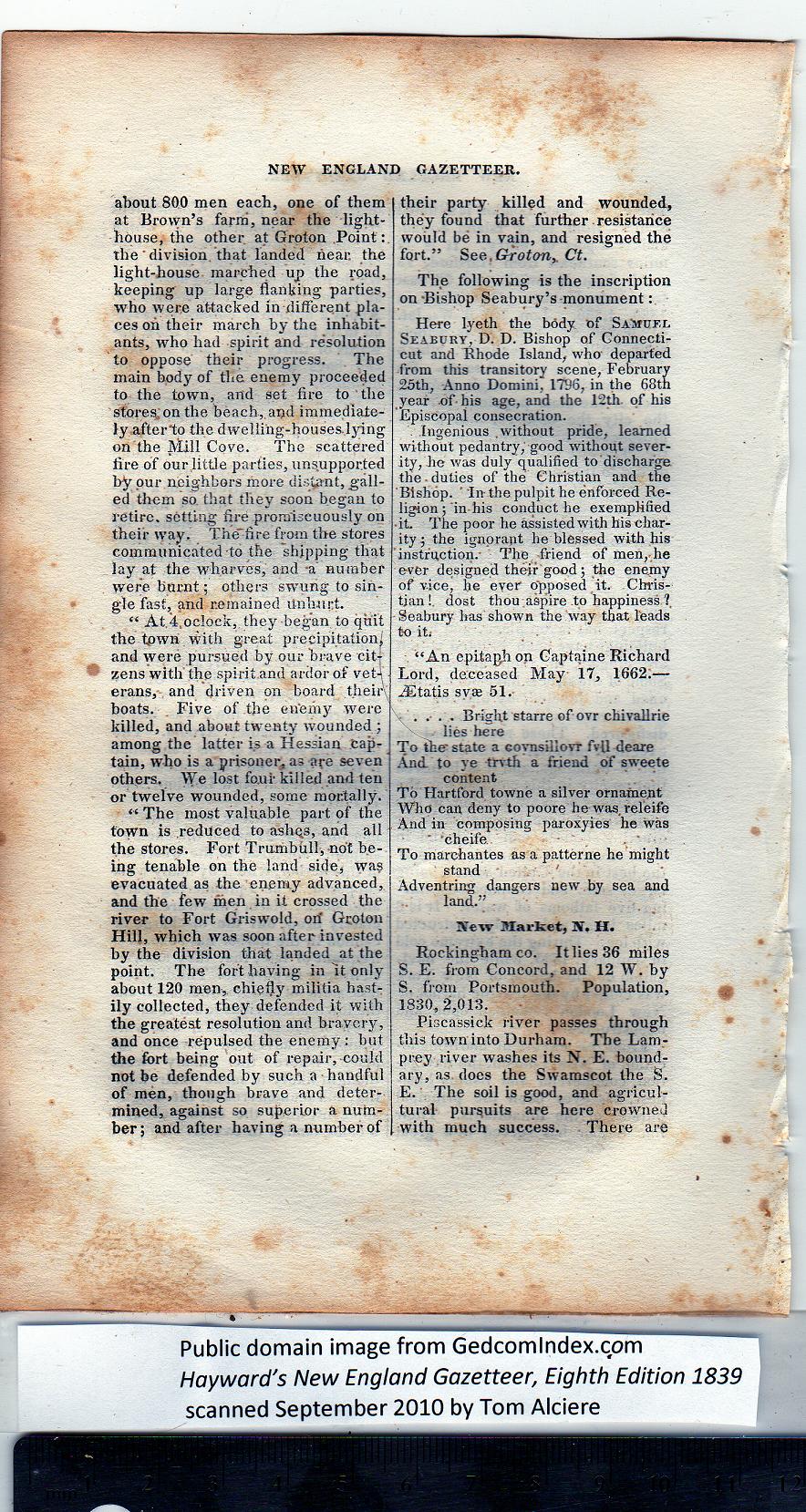|
about 800 men each, one of them \
at Brovvn’s farm, near the light-
house, the other at Groton Point:,
the ' division, that landed near the
light-house marched up the road,
keeping up large flanking parties,
who were attacked in different pla-
ces oh their march by the inhabit-
ants, who had spirit and resolution
to oppose their progress. The
main body of the enemy proceeded
to the town, and set fire to the
stores, on the beach,, and immediate-
ly after*to the dwelli'ng-houseslying
on the Mill Cove. The scattered
lire of our little parties, unsupported
by pur neighbors more distant, gall-
ed them so. that they soon began to
retire, setting fire promiscuously on
their way. The"fire from the stores
communicated*to the shipping that
lay at the wharves, and -a number
were burnt; others swung to sin-
gle fast, and remained Unhurt.
“ At.4,ocIock, they began to quit
the town with great precipitation^
and were pursued by our brave cit-
zens with the spirit and ardor of vet-
erans, and driven on board their\
boats. Five of the en'emy were
killed, and about twenty wounded ;
among the latter is a Hessian cap-
tain, who is a prisoner, as ape seven
others. We lost fo.ur killed and ten
or twelve wounded, some mortally.
“ The most valuable part of the
town is reduced to ashqs, and all
the stores. Fort Trumbull, not be-
ing tenable on the land side, was
evacuated as the enemy advanced,
and the few men in it crossed the
river to Fort Griswold, on Groton
Hill, which was soon after invested
by the division that landed at tbe
point. The fort having in it only
about 120 men, chiefly militia hast-
ily collected, they defended it with
the greatest resolution and bravery,
and once repulsed the enemy: but
the fort being out of repair, could
not be defended by such a handful
of men, though brave and deter-
mined, against so superior a num-
ber; and after having a number of
their party killed and wounded,
they found that further resistance
would be in vain, and resigned the
fort.” See.Grotony. Ct. |
The following is the inscription
on-Bishop Seabury’s -monument:.
Here lyeth the body of Sa>tuf.l
Seabury, D. D. Bishop of Connecti-
cut and Rhode Island, who departed
from this transitory scene, February
25th, Anno Domini, 1796, in the 68th
year .of his age, and the 12th of his
Episcopal consecration.
. Ingenious .without pride, learned
without pedantry, good without sever-
ity, he was duly qualified to'discharge
the duties of the Christian and the
Bishop. ’ In the pulpit he enforced Re-
ligion ; in his conduct he exemplified
• it. The poor he assisted with his char-
ity the ignorant he blessed with his
instruction. The friend of men, he
ever designed their good; the enemy
of vice, he ever opposed it. Chris-
tian !. dost thou aspire to happiness 1
- Seabury has shown the way that leads
tO it;
. “An epitaph on Captaine Richard
Lord, deceased May- 17, 1662.—
iEtatis svas 51.
. . . . , Bright starre of ovr chivallrie
lies here
To the state a coynsillovr fvfl deare
And. to ye trvth a friend of sweete
content
To Hartford towne a silver ornament
Who can deny to poore he was. releife
And in composing paroxyies he was
’ 'cheife
To marchantes as a patterne he might
stand '
Adventring dangers new by sea and
land.”
Xcw Market, N. H.
Rockingham co. It lies 36 miles
S. E. from Concord, and 12 W. by
S. from Portsmouth. Population,
1830, 2,013.
Piscassick river passes through
this town into Durham. Tbe Lam-
prey river washes its X. E. bound-
ary, as does the Swamscot the S.
E. The soil is good, and agricul-
tural pursuits are here crowned
with much success. There are |
